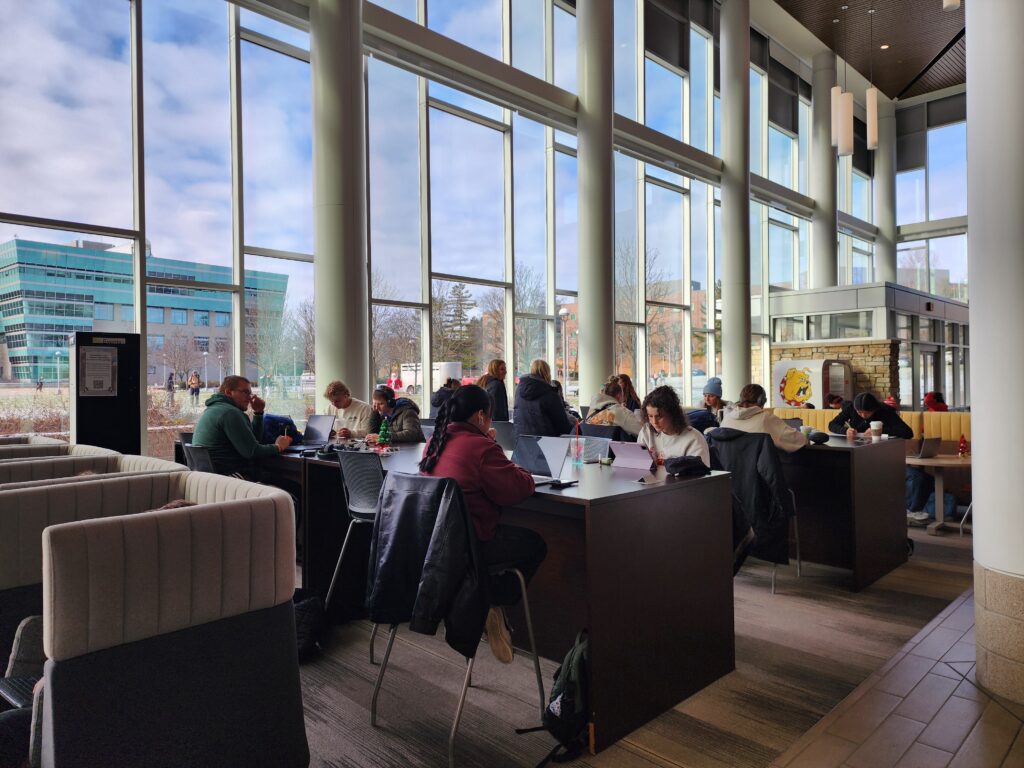Dec. 9 to 13 marks the start of finals week, and students are using every strategy to prepare themselves.
Each exam is different, and each student is different. Regardless of the exam or final project, students are in full work mode, pushing to finish any remaining assignments, study for their upcoming final exams and complete their final projects. But what are they doing to prepare?
Many students shared their thoughts about their study tactics and rituals.

Automotive engineering sophomore Aiden Augustine explained one of his methods of study.
“A strategy I always use is to review your material before you go to bed and then when you wake up, that’s how it usually sticks. I always use that and it’s worked pretty well for me through freshman and sophomore year,” Augustine said. “I start out by making a Quizlet and using my study material, study materials to make the Quizlet, and then just study from there, pretty much.”
Among the students interviewed, one of the most common study tools used was Quizlet. Augustine also talks about his upcoming exams, including a chastity electrical exam, an English paper, a material science exam and a chemistry exam.
“Chemistry is just my weakest subject. It’s always been a struggle for me, even in high school. So it’s just something I have to prepare for the most,” Augustine said. “I’m a little nervous, but I’m a pretty good test taker, so I usually don’t get too nervous about it, and I just go in and try to do my best. That’s all you can really do.”
Students would feel nervous because of the pressure from other classes. This could lead to feelings of pressure because it will affect their grade. With each class having a different grading scale, final projects or exams could be worth up to 100 points or higher.
Educational leadership senior Kylie Branscombe shared her thoughts about an administration’s practice final paper she has to write.
“I’m nervous about the big paper for administration’s practice. I’m not gonna lie. I have not started it yet, and I haven’t even looked at it. It’s because it’s very intimidating, but I am excited to finish it and turn it in once I get to that point,” Branscombe said. “It is 100 points and it could drop me from an A to anywhere to a C, and I don’t want to drop that far just because I’ve worked this hard this semester on keeping my A so it does make me nervous.”
The points for each final paper or exam can vary depending on the class. However, what they all have in common is that they are all likely worth half of the entire grade of the class for that student. Aside from the high point influence one piece of paper can put on a student, in some cases, the professor teaching the subject can make it difficult as well.
Finance freshman Connor McDonough said that microeconomics was his hardest class.
“Microeconomics is a struggle because my professor is kind of tough. I like my grade in the class and I don’t want it to go down,” McDonough said.
Classes can be difficult. The material can be overwhelming. Teachers, like McDonough’s microeconomics professor, can be tough, but one student does not have to go through it alone. Making time out of a busy schedule can save students the trouble of stressing out, and getting together with friends or classmates can help influence students to get more work done.
“I try to find to find some time in my day, probably at night, because I have hockey practice during the days, and find a quiet place,” McDonough said. ”Sometimes me and my teammates will get together and try to get some work done. So someone’s in my class, they can help me out. My roommate and I are in the same history class, so we’ll probably help each other out for that.”
Sometimes it is not just a matter of who students study with but also where they study. Depending on what a student prefers, study spaces can be quiet or crowded. Spaces can affect student concentration both positively and negatively.
“Maybe just space it out and try not to procrastinate. Like I procrastinate probably more than I should, but do a little each day,” McDonough said.
Procrastination can affect all students. Having a large workload or a difficult teacher can influence a student’s need to procrastinate. With this in mind, places like beds and dorms can easily affect students because it allows them to feel too relaxed to the point where procrastination is almost unavoidable.
Branscombe talked about how she utilizes FLITE.
“FLITE is my favorite place to do homework. Just because it’s quiet on the third floor, I like to reserve rooms. I try not to do it at home because that’s when I’ll sit down and do Netflix or whatever. So I try to not go home. I try to either go to the [David L. Eisler Center] to do it or FLITE somewhere I’m not too comfortable,” Branscombe said.
By using this tactic, Branscombe can hold herself accountable for her work while avoiding distracting environments. By limiting procrastination and learning to work with it, students can hold themselves accountable and shine.
“Try not to study where you’re comfortable. Try to do it somewhere like the library, Biggby, Starbucks, those places you’re not gonna lay down, like your bed. Try to always have a spot to sit that’s not your bed, that’s still comfortable, but not too comfortable where you can relax and go to sleep or anything like that.”
Rest assured, when all exams are finished and the work is complete, students can relax for as many hours as they want. All it takes is the right amount of concentration, comfort and accountability towards work.
